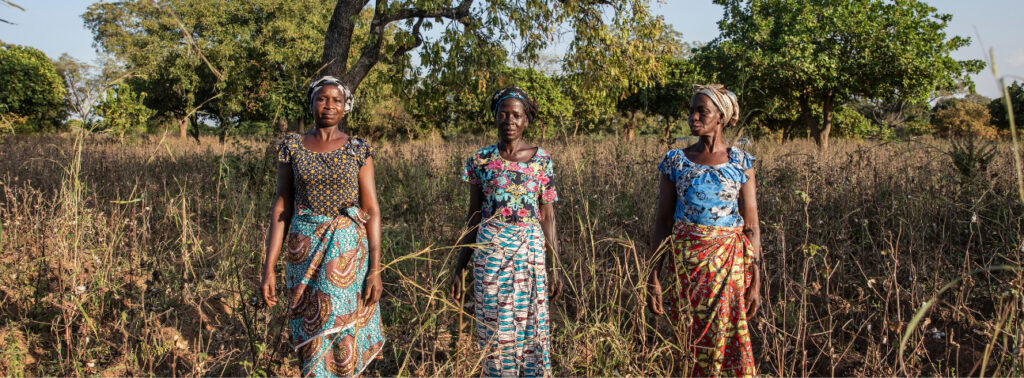The Fairtrade Foundation has kicked off a campaign inviting the cosmetics industry to invest in and work alongside West Africa’s women shea entrepreneurs.
These pioneers are paving the way to a fairer, more ethical beauty industry.
Fairtrade, which has seen a surge in its range of beauty and cosmetics products in recent years (150 products available in 2022, compared to 250 in 2023), wants UK businesses to invest in four Fairtrade-certified shea producer groups in Ghana, Burkina Faso and in Cote D’Ivoire, as well as an additional six co-operatives in Ghana set to gain certification this year.
Consumer demand
Launching officially this week, the campaign asks shoppers to ‘tag a beauty brand’ via Facebook, Instagram, or Twitter, to show the strength of consumer demand for sustainably made shea containing products, such as:
- body butter
- hand cream
- lip salve
- shampoo
- conditioner
- bars of soap
- washing-up liquid
- and much more!
A sustainable supply of shea
The significant increase in the number of producer groups cultivating certified shea this year will enable a consistent, sustainable supply of Fairtrade shea butter to the sector. Demand for meaningful and ethical beauty products is continuing to increase*.
Growth in Fairtrade shea already indicates demand, with volumes of shea licensed by the Fairtrade Foundation more than doubled over the past two years.
Kerrina Thorogood, Partnerships Director at the Fairtrade Foundation, says: ‘At Fairtrade, we believe beauty products shouldn’t cost the earth or compromise human rights. Consumers think this too.
Research** shows that shoppers are actively exploring the origin of the ingredients in their beauty products and are particularly concerned with ethical and environmental credentials.
At Fairtrade, we believe beauty products shouldn’t cost the earth or compromise human rights. Consumers think this too.
Kerrina Thorogood, Partnerships Director at the Fairtrade Foundation
‘Shoppers want transparency and brands that make a difference, yet the wider beauty industry still isn’t talking enough about the people and stories behind the ingredients in products – including shea. That’s why we’re rapidly expanding our work in the beauty sector and are excited to launch this shea campaign to drive deeper change for the women behind this popular ingredient.’
She adds: ‘Thanks to trust in the FAIRTRADE Mark (79%, Kantar Profiles Q1 2023), brands who back Fairtrade can reassure their customers that the shea butter in their products is a sustainably sourced, natural ingredient. As new shea butter co-operatives join Fairtrade and supply increases, shea producers are keen to partner with more beauty businesses, through Fairtrade.
It doesn’t just make commercial sense: it’s also the right thing to do.
‘When you choose Fairtrade shea, you don’t just strengthen your brand and sustainability credentials, but you make a real difference in the lives of the women who produce it. It doesn’t just make commercial sense: it’s also the right thing to do.’
Exclusive business event
Fairtrade’s campaign comes ahead of a unique 60-minute roundtable learning event, taking place on Tuesday 13 June at 3pm.
At the event, businesses will have an opportunity to find out more about Fairtrade shea butter, with speakers including:
- Lisa Oxenham, award-winning health and beauty editor, journalist, stylist, creative director, content creator and brand consultant
- Linda Lariba Atibilla, shea butter entrepreneur and President of Hope Givers Shea Butter Cooperative in Ghana.
The difference Fairtrade shea makes
Fairtrade beauty products offer an additional market opportunity for farmers who already produce ingredients such as butters, nuts, and oils, giving them access to new markets.
For buyers, establishing direct links with certified women groups makes supply chains more efficient. When businesses source Fairtrade artisanal shea butter directly from women entrepreneurs who have processed it themselves, it keeps the added value in the women’s hands.
As well as directly supporting growers, investment into Fairtrade shea by businesses will also benefit Fairtrade’s producer network, Fairtrade Africa, who provide local support to growers – a feature that sets Fairtrade apart from other certifications.
Investment in women
In 2021, Fairtrade launched a partnership with the Campaign for Female Education (CAMFED) and the Waterloo Foundation to support women-led shea co-ops (around 3,400 producers, including women like Linda Lariba Atibilla) to unlock Fairtrade shea market and community development opportunities.
As part of this collaboration, Fairtrade Africa and CAMFED have been supporting the six Ghanaian shea co-ops with training and advice to help them reach the Fairtrade Standards. This includes business and finance management, and improvements to supply, facilities, quality, and business capacity.
In 2023, the total expected supply of Fairtrade shea from the six groups in Ghana is estimated to reach thousands of metric tons, making now the ideal time for brands to invest in Fairtrade shea.
By sourcing shea butter on Fairtrade terms, brands can ensure shea producers earn a fairer price for their product, in line with the Fairtrade Standards. Signing up to partner with Fairtrade means businesses can trace Fairtrade purchases from end to end and guarantee that the Fairtrade Price and Premium has been paid.
For women shea producers, prices fluctuate heavily and it’s often hard for them to guarantee a fair price and forecast sales for the months ahead. They can use the extra Fairtrade Premium they receive to support their communities to thrive by investing in areas such as education or forest-friendly interventions to support the sustainability of wild shea trees.
– ENDS –
For more information, images and interviews, contact Mollie Letheren Smith via:
- Email: media@fairtrade.org.uk
For business enquiries, please contact our commercial team via:
- Email: commercial@fairtrade.org.uk
*The global market value for natural cosmetics and personal care is expected to increase from 37 billion dollars in 2022 to roughly 59 billion dollars in 2031 (Source: Statista, 2023).
** Consumers already prefer to buy a Fairtrade labelled beauty and wellness product over a non-labelled one: 12% (Non-labelled) vs 58% (labelled) (Source: GlobeScan consumer research, 1,037 UK representative consumers, May 2021).
Photo credit: Producers at the WOBIN Fairtrade Cooperative in Côte d’Ivoire
